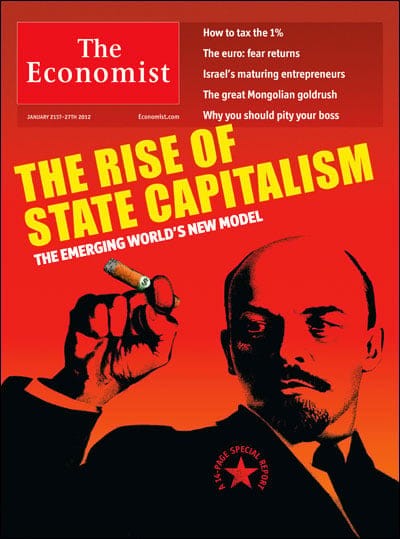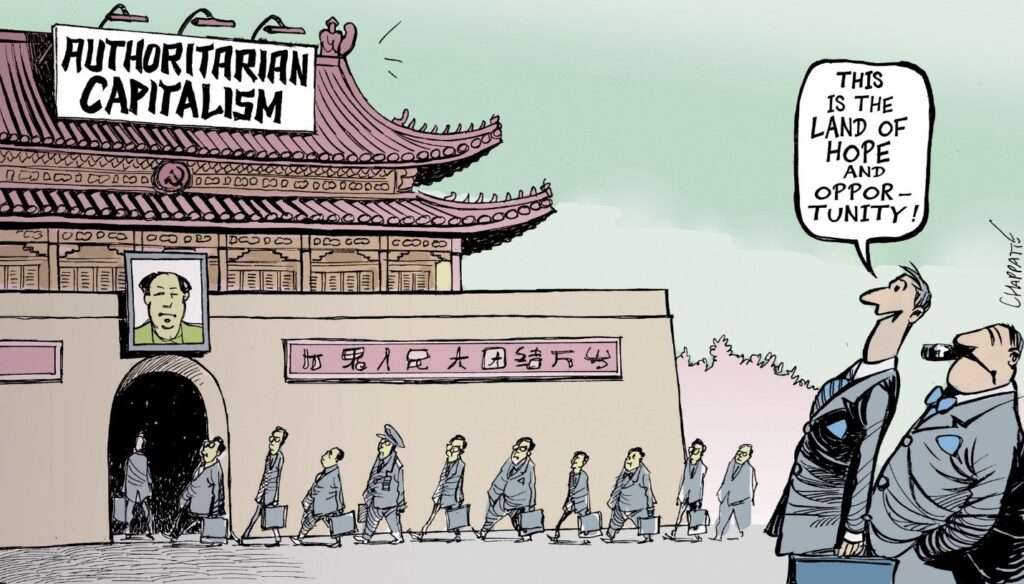
01 Nov “State Capitalism” is Socialism
“America has become the poster child for creeping socialism.” – The Lonely Realist
There is no such thing as “State capitalism.” That’s a term invented to put a positive spin on State control of markets and industries – in other words, it’s a code-phrase for socialism. Capitalism, after all, does not include a policy of State intervention in free markets or even partial State ownership of national champions. It instead is “an economic system in which a country’s trade and industry are controlled by private owners for profit.” Capitalism means that private individuals and businesses own and control the production and consumption of goods and services … without unnecessary government interference or restriction. That production and consumption is based on the supply and demand that flow from the natural operation of a market economy. It is not set by government edict or planning or by centralized government policy-making.
The phrase “socialist market economy” is a similar non sequitur. A “market economy” is a capitalist one. Adding socialism means State control – and State control does not foster free trade or free industry. It substitutes government interests for private trade and private industry — that is, it is anti-capitalist.
The heavy hand of “socialism” is apparent in the practice of “State capitalism.” Socialism, after all, is “an economic and political philosophy characterized by state ownership of the means of production in which the state exercises substantial control over economic affairs.” Whereas a socialist lean in the American economy historically has been a core component of left-wing ideology, it no longer is limited to Democratic Party progressives. It now is embraced by the MAGA right to address perceived deficiencies in the operation of America’s economy. The exercise of centralized government control means that a more intrusive Federal government is taking a hands’-on approach (and control over) core private industry.
“State capitalism” rejects the underlying capitalist philosophy described by John Maynard Keynes – that is, that capitalism is “the astounding belief that the most wickedest of men will do the most wickedest of things for the greatest good of everyone.” “State capitalism” is the belief that “the State is more competent to substitute its wickedness for the wickedness of free market capitalists,” which is diametrically opposite to the Reaganite principle that “government is not the solution to our problem, government is the problem.” “State capitalism” therefore represents State capture through soft spinning the embrace of creeping socialism. Unnoticed by most Americans, the U.S. economy today has become a leader in the global trend towards centralized government control. It cannot be labeled purely capitalist and no longer is the “vulture capitalist nation” previously criticized … and envied … by Europeans. TLR has been sounding the alarm about America’s slide into socialism, a process of “Statism” that TLR defined as “the activist government intervention in markets, manufacturing, corporate economics and hiring practices” and “funded fiscally by massive deficit spending.”
That is not to say that there isn’t public support for some level of State intervention or that Statism necessarily leads to economic disaster…, although it frequently does (as Winston Churchill noted, “The inherent vice of capitalism is the unequal sharing of blessings; the inherent virtue of socialism is the equal sharing of miseries”). Despite the trend towards adoption of some version of “American socialism,” TLR continues to be a strong believer in the American brand of capitalism and, therefore, in an undiluted far less government-intrusiveness. Although FDR initiated the insertion of socialism socialist structures into America’s government and even though subsequent Presidents from both Political Parties have increased its size, breadth and depth, it is only recently that America’s embrace of socialism — by both Parties — has taken major leaps forward, recently during the Biden Administration when government entitlements and subsidies targeting core American industries reached new heights, and then this year under policies executed by President Trump. President Biden’s efforts to expand the New Deal of Franklin Roosevelt were junked by Trump 2.0. What President Trump has substituted nevertheless isn’t an increased reliance on private enterprise, but rather a permutation of socialism based on the Chinese model of beneficent centralized government policy-making. For example (and quoting in part from a recent piece in The Economist), the Trump Administration has been creating “State-owned enterprises with American characteristics” (an emulation of Chairman Xi’s policy of creating “Chinese champions with Chinese characteristics”) by turning corporate icon Intel into a government-owned champion, demanding and receiving a “golden share” from US Steel (and promptly using it to prevent the closure of an Illinois plant), pressuring Nvidia to agree to the U.S. government receiving 15% of the proceeds from Nvidia’s export of H20 chips to China, taking equity interests in Cameco, MP Materials, Lithium Americas and other companies deemed by government edict to be stakeholders in “strategic industries,” and firing the head of the Bureau of Labor Statistics after the BLS failed to provide the statistics preferred by the Administration.
President Trump treats his approach to “State capitalism” as part of a consistent “national conservative” philosophy. It is not. It instead mirrors the approach of left-wing progressives by seeking an activist, Statist Federal government approach in addressing economic issues. In that sense, both left-wing progressives and MAGA conservatives are in agreement on a populist agenda that rejects traditional American capitalism in favor of a “new New Deal.” As George Selgin motes in his recent book, “False Dawn: The New Deal and the Promise of Recovery, 1933-1947,” “Donald Trump’s administration … is the most economically interventionist administration — by this important metric, it is the most progressive administration — since the New Deal,” concluding that it is “draining [capitalist] dynamism from the economy.” Today’s Democrats and Republicans may accurately be grouped together by future historians as “fellow travelers” of Statism.
China has served many as an exemplar of successful centralized economic planning. Any number of commentators accordingly have mistakenly highlighted China’s economic outperformance as evidence of the superiority of centralized government planning over American capitalism. The MAGA New Deal apparently is modeling itself on the Chinese example. Employing the label “State capitalism,” however, doesn’t transmute centralized government economic planning into an improved version of American capitalism. It’s an Americanized version of socialism, pure and simple.
Finally (from and good friend)






No Comments